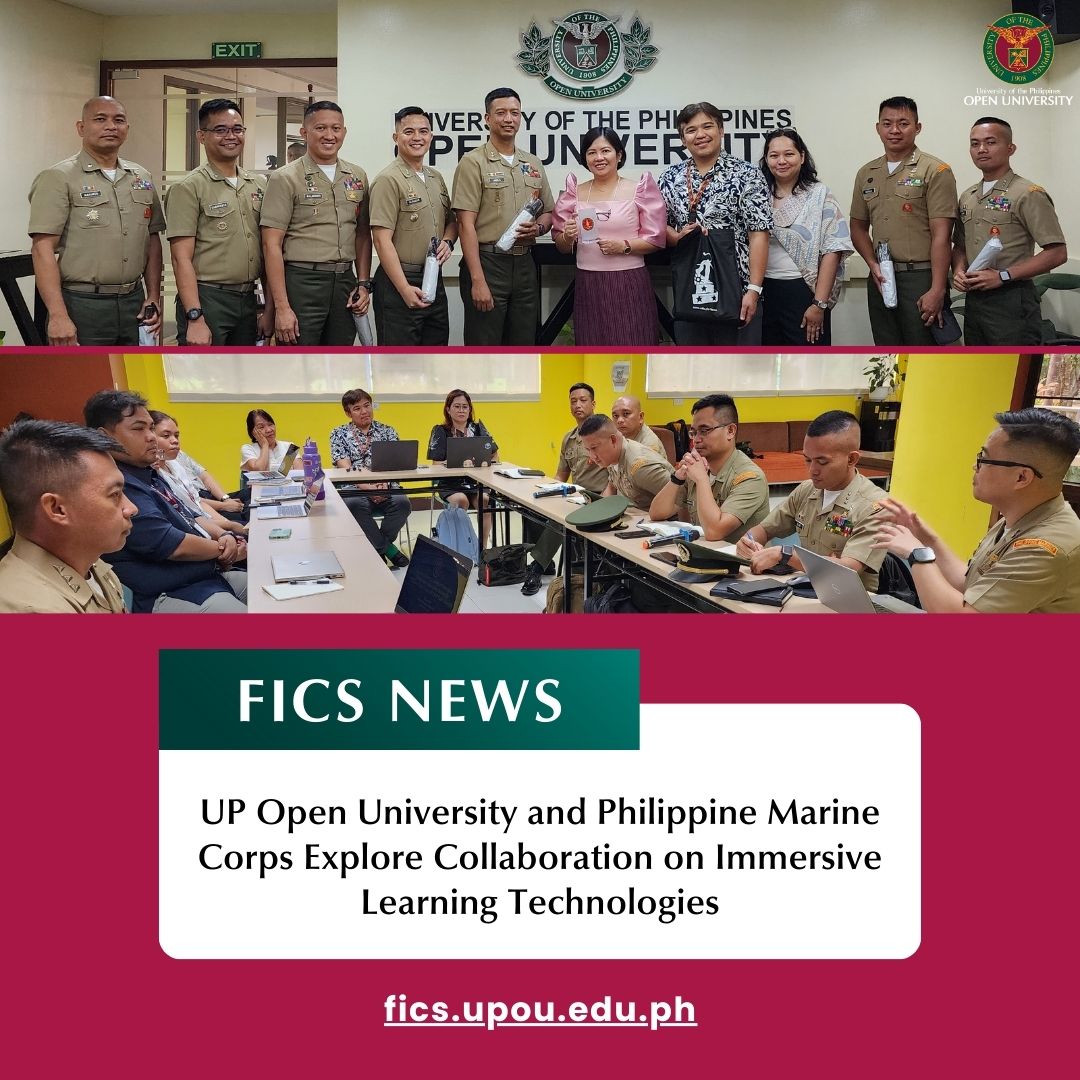
A benchmarking meeting between the Philippine Marine Corps (PMC) and the University of the Philippines Open University (UPOU) was held on 19 May 2025, at the Sandbox, UPOU Headquarters, Los Baños, Laguna. The visit focused on potential collaborations in immersive learning and military education, with the Faculty of Information and Communication Studies (FICS) leading the discussions.
The UPOU delegation was led by Dean Roberto Figueroa Jr., accompanied by Dr. Melinda Bandalaria, who heads the program development of the Faculty of Information and Communication Studies’ (FICS) initiatives on massive open online courses (MOOCs) and microcredential programs. Joining them were Assistant Professors Blancaflor Arada, Lei Kristoffer Lactuan, and Margaret Suarez. Representing the Philippine Marine Corps (PMC) were LtCol John Paul Jacla, LtCol Ronnel Almazan, LtCol Vince Edward Salmingo, Maj. Sivel Sarmiento, Maj. Orville Mahimer, SSgt Jame Olaer, Cpt. Mark Andrew Badilla, Cpt. Kevin John Elao, and PFC Jereden Army Hernando. The discussions focused on exploring how UPOU can support the Philippine Navy and PMC through flexible, technology-enhanced learning pathways.
The meeting focused on advancing collaborative initiatives to support military education, training, and innovation. Key areas discussed included the development of lifelong learning opportunities—such as graduate degrees, certificate programs, and modular courses—specifically tailored for military personnel. These programs aim to recognize and build upon prior military training and experience.
Leadership and personal development were also central to the discussions, with proposed training areas covering ethics, effective communication, financial literacy, and cybersecurity. The integration of immersive learning technologies—including virtual and augmented reality, simulation-based training, and wargaming exercises—was explored as a means to enhance military competencies and experiential learning.
Faculty capacity-building was highlighted through the promotion of digital education strategies, including microcredentialing and the use of instructional technology. Knowledge management initiatives were proposed, such as the creation of open educational resources (OERs), mobile-friendly doctrine viewer apps, and systems for personalized content delivery.
Potential joint research areas were identified in digital transformation, artificial intelligence integration, and policy frameworks for microcredentials. Broader themes such as disaster preparedness, health systems, and sustainable or green technologies were also discussed to support wellness and resilience in military operations.
Opportunities for collaboration were further expanded through the Immersive Spatial Technologies and Realities (ISTaR) Labs, with Asst. Prof. Lactuan as the designated point person for related projects involving the PMC. Dean Figueroa also introduced the Master of Information Systems (MIS) program as a potential academic pathway for military personnel seeking to advance their education.
As part of the engagement, the PMC delegation paid a courtesy visit to UPOU Chancellor Dr. Joane V. Serrano. During the visit, they shared their vision and future plans for collaboration, reinforcing a shared commitment to innovation, capacity building, and transformative education.
To formalize the partnership and align initiatives with the Philippine Qualifications Framework, a Memorandum of Understanding (MoU) between UPOU and the PMC is anticipated.
Written by: Christine Faye Pesimo | Edited by: Joy Abigail Rebulanan








